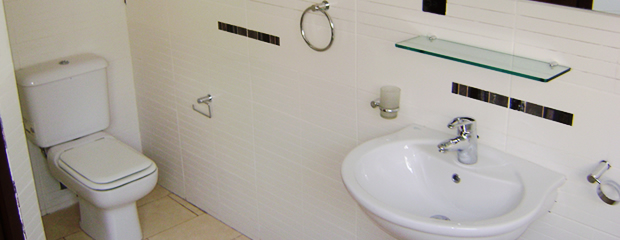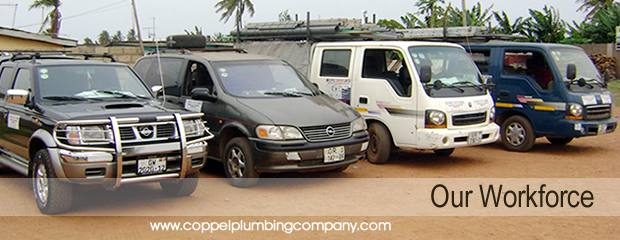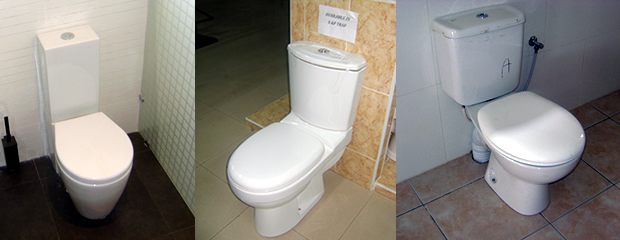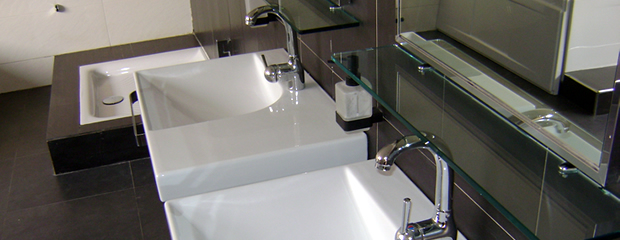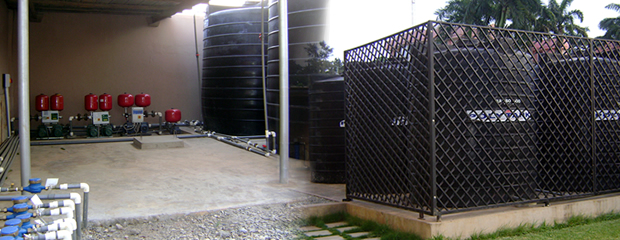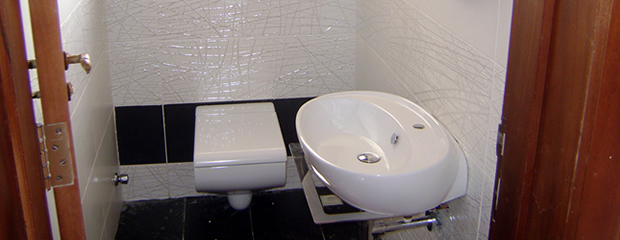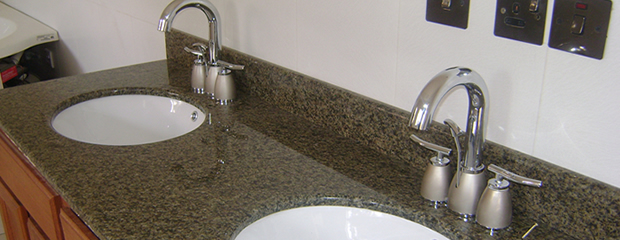| |
| |
| Plumbing |
| |
Plumbing is the system of pipes and drains installed in a building for the distribution of potable drinking water and the removal of waterborne wastes, and the skilled trade of working with pipes, tubing and plumbing fixtures in such systems. A plumber is someone who installs or repairs piping systems, plumbing fixtures and equipment such as water heaters.
The plumbing industry is a basic and substantial part of every developed economy due to the need for clean water, and proper collection and transport of wastes. The word "plumbing" comes from the Latin plumbum for lead, as pipes were once made from lead.
Plumbing is usually distinguished from water supply and sewage systems, in that a plumbing system serves one building, while water and sewage systems serve a group of buildings or a city. |
|
| |
|
|
|
|
 |
| A complex arrangement of rigid steel piping and stop valves to regulate flow to various parts of the building |
Plumbing originated during ancient civilizations such as the Greek, Roman, Persian, Indian, and Chinese cities as they developed public baths and needed to provide potable water and drainage of wastes, for larger numbers of people. Standardized earthen plumbing pipes with broad flanges making use of asphalt for preventing leakages appeared in the urban settlements of the Indus Valley Civilization by 2700 B.C.[2] The Romans used lead pipe inscriptions to prevent water theft.
Improvement in plumbing systems was very slow, with virtually no progress made from the time of the Roman system of aqueducts and lead pipes. Plumbing was extremely rare until the growth of modern densely-populated cities in the 1800s. During this period, public health authorities began pressing for better waste disposal systems to be installed, to prevent or control epidemics of disease.
Earlier, the waste disposal system had merely consisted of collecting waste and dumping it on the ground or into a river. Eventually the development of separate, underground water and sewage systems eliminated open sewage ditches and cesspools. Most large cities today pipe solid wastes to sewage treatment plants in order to separate and partly purify the water before emptying into streams or other bodies of water. For potable water use, galvanized iron piping was commonplace in the United States from the late 1800s until around 1960.
After that period, copper piping took over, first soft copper with flared fittings, then with rigid copper tubing utilizing soldered fittings. The use of lead for potable water declined sharply after World War II because of increased awareness of the dangers of lead poisoning. At this time, copper piping was introduced as a better and safer alternative to lead pipes. |
|
|
Water systems of ancient times relied on gravity for the supply of water, using pipes or channels usually made of clay, lead, bamboo, wood, or stone. Hollowed wooden logs wrapped in steel banding were used for plumbing pipes, particularly water mains. Logs were used for water distribution in England close to 500 years ago. US cities began using hollowed logs in the late 1700s through the 1800s.
Present-day water-supply systems use a network of high-pressure pumps, and pipes in buildings are now made of copper, brass, plastic, or other nontoxic material.
Due to its toxicity, lead has not been used in modern water-supply piping since the 1930s in the United States, although lead was used in plumbing solder for drinking water until it was banned in 1986. Drain and vent lines are made of plastic, steel, cast-iron, or lead. The straight sections of plumbing systems are called "pipes" or "tubes".
A pipe is typically formed via casting or welding, whereas a tube is made through extrusion. Pipe normally has thicker walls and may be threaded or welded, while tubing is thinner-walled and requires special joining techniques such as brazing, compression fitting, crimping, or for plastics, solvent welding. These joining techniques are discussed in more detail in the piping and plumbing fittings article. |
|
|
In addition to lengths of pipe or tubing, pipe fittings are used in plumbing systems, such as valves, elbows, tees, and unions. Pipe and fittings are held in place with pipe hangers and strapping.
Plumbing fixtures are exchangeable devices using water that can be connected to a building's plumbing system. They are considered to be "fixtures", in that they are semi-permanent parts of buildings, not usually owned or maintained separately.
Plumbing fixtures are seen by and designed for the end-users. Some examples of fixtures include water closets (also known as toilets), urinals, bidets, showers, bathtubs, utility and kitchen sinks, drinking fountains, ice makers, humidifiers, air washers, fountains, and eye wash stations. |
|
|
| Threaded pipe joints are sealed with thread seal tape or pipe dope. Many plumbing fixtures are sealed to their mounting surfaces with plumber's putty. |
|
|
|
| |
